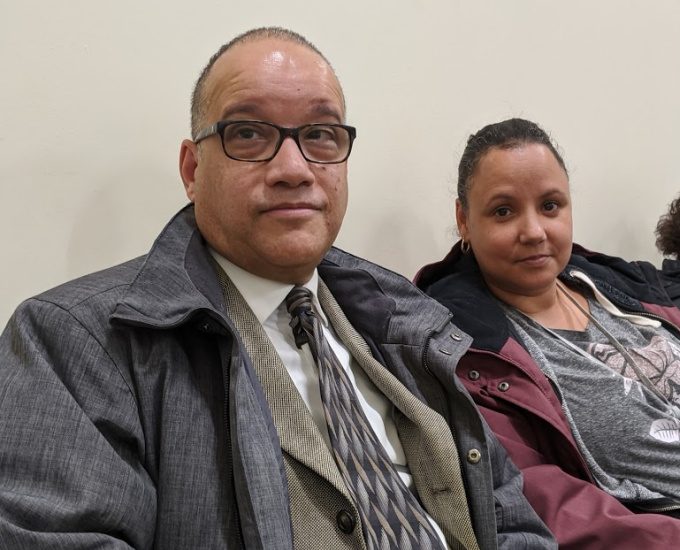
KJIPUKTUK (Halifax) – An ugly racist incident on a Halifax Transit bus that happened well over a year ago finally reached a conclusion of sorts, today at the courthouse on Spring Garden Road in Halifax.
On October 25, 2018, Dr. Isaac Saney, a Black Dalhousie University professor, suffered verbal abuse and was threatened by a racist couple while he was travelling on the bus with his four-months old baby daughter.
This is what happened.
When Saney boarded a bus on Spring Garden Road, with his daughter in a stroller, a middle aged white woman and a younger white male started yelling racist and xenophobic insults at Saney. The bus driver eventually kicked the couple off the bus, and reported the incident.
But the ordeal wasn’t over yet. When Saney and his little daughter got off the bus at Scotia Square, the couple was waiting for them, and the shouting and threats continued.
It wasn’t until Saney, and a passenger who joined Saney and his baby daughter out of concern for their safety, both called police, that things calmed down.
Today the woman, who faced charges of criminal harassment, uttering threats and criminal disturbance, was sentenced to a 60 days conditional sentence, 30 days of house arrest, 18 months probation, and 50 hours of community service. Anger management counselling was also included in the sentence.
See also: Woman charged in racist incident on Halifax bus makes brief court appearance
In his decision the judge considered the tearful apology the woman made today, her lack of a criminal record, but also, as an aggravating factor, the racist nature of the verbal attacks.
The sentence conformed with the joint recommendation of the Crown and the woman’s defense lawyer. Charges against the man were dropped earlier for lack of evidence.
For Saney the ordeal was terrifying and continues to haunt him to this day.
To have seen my four-months old baby involved in this attack was shocking and frightening and has left me filled with anxiety, Saney told the Court in his victim impact statement. I am haunted by recurring dreams where my baby is attacked and I am unable to defend her.
Saney is a fully committed Transit user, but much of the enjoyment he used to feel has disappeared, he said during an impromptu press conference after the sentencing session.
“I love taking the bus, and I believe in public transit. There’s the environmental footprint, but I also love the social atmosphere of buses, and the people interacting with strangers. There is this kind of public transit community that forms. I used to look forward to taking the bus with my baby. And then all of a sudden, that sense of feeling safe has been robbed from me,” Saney said.
Throughout, Saney has emphasized that buses are public spaces, and that many people in Halifax have no choice but to take the bus or the ferry to get from point A to point B.
Racism-free Transit in Halifax was formed shortly after the incident involving Saney to make sure our buses are safe for everybody. There are strong indications that this is not the case now.
See also: City ill-prepared to deal with racist attacks on Halifax Transit users, group says
“Halifax is becoming an increasingly diverse city in the last maybe 10 years or so. A lot of international students anecdotally and in private have told me what incidents have happened to them. I think that it’s important to understand that this is an attack not just on immigrants, not just on non-white Canadians, it is an attack on all Canadians. The violation of the rights of one Canadian is a violation of the rights of all Canadians,” Saney said.
Nonetheless, what appeared to be a commitment by Halifax Transit to actively engage with the problem seems to have frittered away again.
Racism-free transit in Halifax pressed for the perpetrators to be charged with committing a hate crime. The Crown chose not to pursue that avenue, believing that proving such a case would be too difficult.
“When the bar is set so high, than I think the hate crime legislation needs to be rewritten so that we can actually use it to particularly target these kinds of excessive racist acts against people,” Saney said.
“Because hate crime is such a politicized concept in our society often the okay has to come from the Department of Justice, rather than from the prosecutor. That’s a big issue as well. All this is a question for the legislature,” Saney said.
See also: Group wants to make Halifax Transit and other public spaces racism–free
Note: From now on it is the Nova Scotia Advocate’s policy to not identify people charged or convicted in criminal court, or publish their photos. Doing so serves no purpose whatsoever.
With a special thanks to our generous donors who make publication of the Nova Scotia Advocate possible.
Subscribe to the Nova Scotia Advocate weekly digest and never miss an article again. It’s free!




I agree Legislation is key in dealing with hate crimes and racially motivate verbal and physical assaults. Punishment as it is now seems too lenient. There is also the education aspect of racism that was not addressed by the court.
Halifax Transit can do more in responding to situations like this. A lifetime ban from using public transit doled out to racially abusive people such as this woman is a good start to restoring the peaceful enjoyment of public transit.
Hi:
It is regretful that identification of convicted criminales is withheld by your publication. The purpose of having their identities is to know who the not so nice people in our midst are.
Cheers.
In Holland, where I am from, people involved in the criminal justice system are never identified, and nobody there thinks that is a problem. There is no need to further stigmatize people who often are marginalized already, typically are poor and often deal with mental health issues. There is also the matter of making life more difficult for innocent relatives, say the person’s children. In Canada we identify an accused even before that person is found guilty. This is our policy, unless there is a real public interest in knowing the identity, say a politician, or a cop, or a hardened Nazi.
Anyway, if you don’t like it, just go read the Chronicle Herald or whatever, I don’t care.
My question is what does Metro TRANSIT take from this? Are they going to train drivers in what to do, or how about putting up signs saying racist behaviour is not tolerated on Transit? I don’t imagine one manager from Metro Transit bothered to show up to court yesterday. Why not? Certainly they knew about the case.
I am so sorry to hear that happened to such a nice man. Also: It’s his four-month old baby, not his four-months old baby.